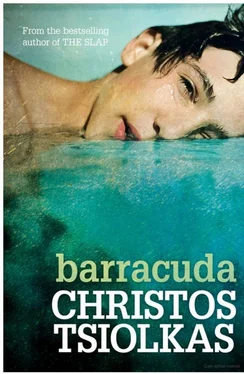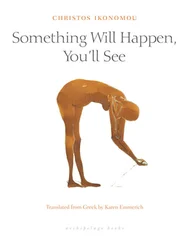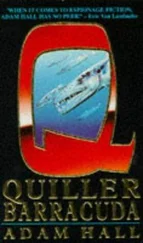On the other side of the pool, Martin was thrashing through the water. If Frank Torma had been walking the length of the pool he would have been shouting, ‘Do not soot your lood too fast, Taylor! Slow it down, slow it down.’ It was Taylor’s weakness: he went too hard too early, exhausted himself. Danny slipped beneath the surface of the water, slowed his stroke till he was in line with Martin, till his left arm punched the water with Martin’s left arm, until his right hand touched the tiles at the same time as Martin’s right hand. Danny turned and Martin turned and Danny thought, I am going to beat you, bastard.
At first Martin was unaware that they were racing. Danny kept the pace, so they were neck and neck, till Martin suddenly sensed it. Danny kicked, picked up speed. Stroke, kick, stroke, breathe. Martin also increased his speed but his kicks were thrashings, his strokes manic, and though he shot ahead his tumble at the turn was inelegant. Danny maintained his pace, the water turning from liquid to air. He let Martin gain half a length, and then a length — stroke, kick, stroke, breathe — was gliding and then Danny began to kick harder, feeling the pull and surge of his muscles in his arms and across his chest, and then he was half a length in front, a steady half a length, breathe, stroke, kick, breathe, stroke, kick, and the water was speaking to him, whispering to him, the water was a tumult, a spray, a thrash of waves as Martin picked up speed; it would not be enough, he had exhausted himself. Danny felt his legs as part of a machine, kick kick kick kick, and he was a body length in front and the water was whispering to him that Martin was dropping back, that Martin was no longer with the water but fighting the water. Danny was one body length, two body lengths, three lengths in front, and Martin had disappeared, he was a whole lap behind, Martin might as well not be in the water, and Danny glided to the end of his lap and pulled himself up on the tiles and exhaled, long, hard breaths, and he was better and faster and stronger and it didn’t matter that it wasn’t a race and that Coach said that his body was demanding a new stroke. He had won.
Martin came up for air beside Danny. His face was red, ugly from the exertion; he gasped for breath, spewing water, shivering, his body trying to adjust to being at rest. Danny wasn’t spent, he felt the waning sun on his shoulders, saw it spread firelight and ruby rays across the sky and sea. He turned to Martin and said, ‘You ever call me Shorty again, I’ll fucking deck ya.’

By the next evening the house was full of guests. Mr Taylor had come down from his office in the city. He nodded to Danny but didn’t speak to him. It wasn’t that Mr Taylor didn’t like him — Martin had assured him that that wasn’t the case. But they could not speak to one another, it was as if their shared language did not have the words in it for them to understand one another. So Mr Taylor nodded and Danny muttered an aho for hello and a té that would do for a thanks.
The grandmother was yet to arrive — she was being driven down from Melbourne by Martin’s youngest uncle — but everyone else was gathered in the enormous living room, waiting for her. Mr Taylor’s eldest sister and her husband were there (she was a car wreck, explained Martin; she was a drunk and he was a loser with no head for money), and their two children, Vincent, who was twenty-one (and a junkie, explained Martin) and Siobhan (who was nineteen and thick as thieves with Emma); another sister and her husband (her second, shrugged Martin, only a schoolteacher, something boring like that); and one more brother and his wife (we call her the gold-digger, said Martin) and their three kids who were all under ten and who were quiet and well-behaved and nothing like Regan or Theo. Danny was wearing his white school shirt and his school tie and was sitting between Martin and Vincent, who smelled a little off, like parmesan cheese, and whose knee kept shaking.
Mr Taylor came out of the study with a painting and held it up for everyone to see. It was small enough for him to lift with one hand, a white canvas on which thin black brushstrokes had created the outline of a woman’s sad face. It was as delicate as a web, thought Danny; as if a rain shower could wash it all away.
‘Well,’ said Mr Taylor, ‘what do we think?’
Mrs Taylor was shaking her head. ‘I’d much prefer a Streeton or a McCubbin for my seventy-fifth,’ she sighed.
‘So would I, dear, but Mama wouldn’t.’
Emma and Siobhan both spoke, Emma first but Siobhan’s echo following almost simultaneously. ‘It’s perfect! Joy Hester is perfect for Nanna.’
‘Thirty-five thousand,’ Martin whispered, his breath warm against Danny’s ear. ‘Can you believe they paid thirty-five thousand for that shit?’

The arrival of the old lady stopped everyone in their tracks. The adults all looked nervous; even the kids fell quiet. ‘Turn off the video, please,’ Mrs Taylor called out, her voice now sounding high and strained. All the adults, and Martin, Emma and their cousins were standing, and Danny thought, God, it is like we are waiting to see the Queen. He too was on his feet, a little agitated, his eyes darting from Martin to Emma to their father, then their mother; Mrs Taylor had her hand lightly touching her throat, as if the old lady were an executioner, as if the old lady might announce, Off with her head . One of the mothers hissed to the smaller kids, ‘Get up, get up now,’ and then the old lady was in the doorway, the youngest uncle behind her. His hair was as fair and neat as Martin’s and Mr Taylor’s, but he wasn’t wearing a tie; he had on a t-shirt with a picture of some woman Danny thought he should recognise, some singer from the punk era, he was sure of it, knew Demet would love her. The old lady didn’t look anything like the Queen. Her youngest son supported her arm but she moved confidently, upright, thin, petite, like a little bird, thought Danny, in a plum-coloured short-sleeved dress that fell just above her knees. Her skin was stretched over the bones of her jaw, and her cheekbones were almost level with the plane of her eyes. Her earrings were huge pearls, her bracelets sparkled, one silver, one ruby and another gold. Mr Taylor approached her and she offered him her cheeks to kiss, one then the other, but apart from lips to skin, their bodies didn’t touch at all.
‘Happy birthday, Mother.’
‘Thank you, Simon.’ Her eyes, unlike the fragile rice paper of her skin, were dark and alive and took everything in; vivid and shining, they rested on Danny for a moment, and then swept across the room. ‘Go say hello to Nanna,’ one of the mothers urged, and the children lined up to receive their kisses on the cheek, one, two, one, two; then it was Emma’s and Martin’s turn, Vincent’s and Siobhan’s, and then she kissed the adults — except, Danny noticed, she didn’t actually kiss the wives of her sons, or the husband of her daughter. In their case, she kissed the air instead, and then pulled back.
Danny was left standing alone in a corner of the room.
‘Who is this?’ the old lady demanded.
‘Nanna, this is my friend, Danny Kelly,’ said Martin. ‘We go to school together.’
The old woman waved him over. Danny approached and held out his hand. She took it, but dropped it almost immediately.
‘Are you Eric Kelly’s son?’
‘No, I’m Neal Kelly’s son.’
‘Who?’ The old woman looked faintly annoyed.
‘We don’t know them, Mother.’ Mrs Taylor stepped in, her voice still avian and tight, as though her windpipe had been elongated. Danny recalled the frog they’d dissected in biology, the intricate raw tubing of the amphibian’s intestines being stretched until they tore. ‘Danny is Martin’s swimming companion.’
Читать дальше










